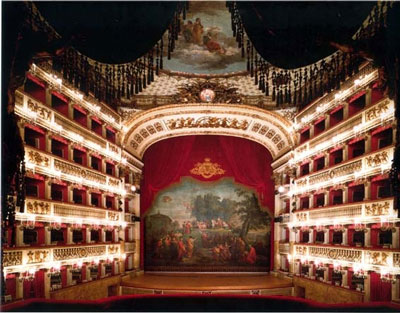
I know--no one is going to believe for a second that I don't know what opera is. No, this is more an "ignorance of origins" kind of post. I came across this little aside in Jacques Barzun's From Dawn to Decadence, correcting my and doubtless many others' assumptions about the word.
"Incidentally, the word opera is not, as one might suppose, the plural of opus, Latin for work. It is another Latin word, opera, plural operae, which means willing work instead of the necessary or forced labor implied by opus. By extension, opera was used by the ancient Romans for any elaborate undertaking, just as we say, "a production". The word certainly fits the reality of staging one of these works as it is described in the history of the great opera houses: a battle with wounded and vanquished before roles and wills are subdued into a temporary unity."
I am an opera fan, though as may easily be suspected, a relatively ignorant one. Barzun surprised me again by saying that it wasn't until the middle of the twentieth century that a divide between music devotees and opera fanatics was healed, the music lovers looking down on the opera types, who often weren't interested in any other sort of music. What brought them together in realizing their common ground? Barzun says it was the advent of the LP, which made it possible to see that the opera without all the hoopla of the production was, in fact, musical. It's always interesting to learn that something we take for granted wasn't at all obvious before some new innovation makes it possible to see or in this case hear things differently.
































Hmm ... perhaps opera and music have been brought even closer together by economic conditions that make opera productions such rare and expensive occasions. I wonder, in other words, if more people than ever before are familiar with opera only through excerpts performed in concert versions.
ReplyDeleteYes, I think that would probably be the contemporary equivalent, and I suppose many more people are familiar with famous arias than are with opera plots. But on the other hand, many of the operas I've seen have been on PBS or even as film, so I don't think cost is the sole reason people don't know full operas anymore. Once again, it probably all comes down to marketing.
ReplyDeleteDon't neglect Bugs Bunny. Today's kids will not get the secondhand exposure we got through "What's Opera, Doc?"
ReplyDelete==============
Detectives Beyond Borders
"Because Murder Is More Fun Away From Home"
http://www.detectivesbeyondborders.blogspot.com/
I don't know. I think everything we saw is getting recycled. At least all the old sitcoms are.
ReplyDeleteA lot of that Warner Brothers stuff was old even when I watched it. But it was there as part of the available programming. If the stuff is available today, who's watching it? (I may be unduly pessimistic because of my recent exposure to the Disney Channel.)
ReplyDeleteYeah, I'm not sure. I'll have to ask the kids in my family, but I'll bet ahead of time that they are familiar with it all. The upside of now is that they are not so 'channeled' as we are, at least if they don't want to be. They can watch tons of stuff on the computer, for instance.
ReplyDeleteThe flip side of having everything to watch is that they mah have too much to watch. I don't mean to suggest that Bug Bunny is an essential part of a liberal education, but it did expose viewers to things that today's viewers don't get. With program's targeted do narrowly to kids these days, they may be missing some of the not-quite-strictly kid stuff, such as the Wagner and the Rossini, that the Warner Brothers cartoons managed to sneak in.
ReplyDeleteI actually saw a couple of interesting specials on the Warner Brothers and their studios recently, and was surprised that they were distinguished for the kind of social commentary they did in their movies. Seems a far cry from the Time-Warner conglomerate of today.
ReplyDeleteIt doesn't surprise me now that they would have snuck a little classical music into their cartoons. I'm wondering if originally, cartoons were aimed so strictly at kids as they now are. Although of course there is also the reverse trend of Simpsons and South Park, etc. But I'm wondering if Bugs and Popeye and all were really just aimed at a general audienc originally, like the comic strips were.
The Disney channel is one thing, but I have to mention the newish Walt Disney Concert Hall, designed by Frank Gehry in downtown L.A. I had the opportunity to go inside it this spring when I went to a once monthly kid's concert. The classical music orchestra was of the highest level, though of course playing easily accessible work, and there were a lot of preconcert musical and craft type activites for the kids before the concert. Obviously a much smaller crowd than is reached on TV, but still, a laudable effort.
Disney may not be an entirely evil empire. A discerning reader complimented Disney rising above the field in the matter of remaking older movies.
ReplyDeleteI believe you're right that the old Warner Brothers cartoons were not aimed solely or even primarily at children. It's that micro-targeting that I (and many other people, too, I think) find disquieting.
================
Detectives Beyond Borders
"Because Murder Is More Fun Away From Home"
http://detectivesbeyondborders.blogspot.com/